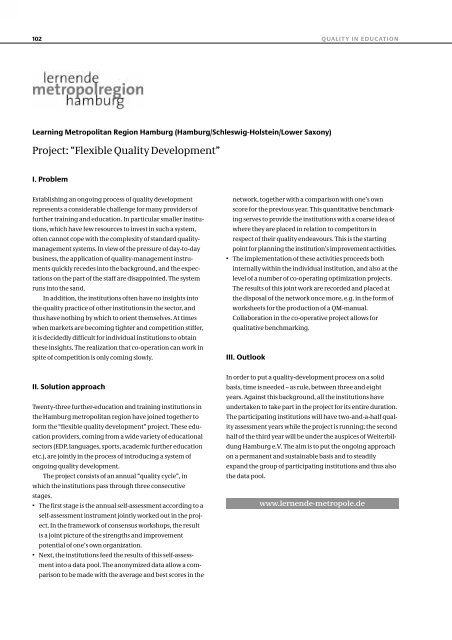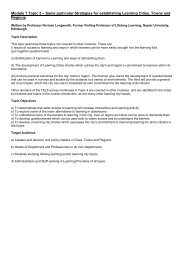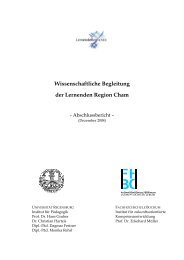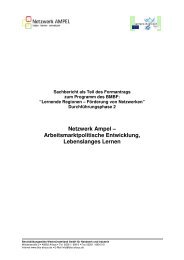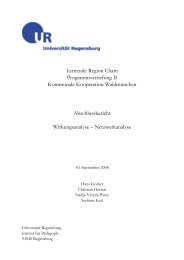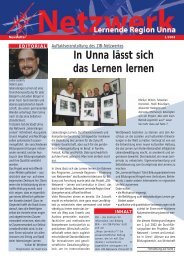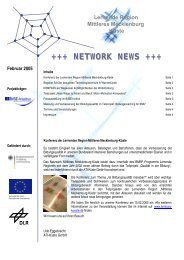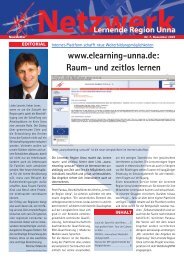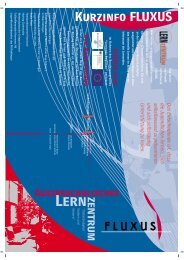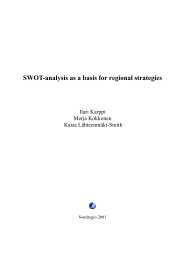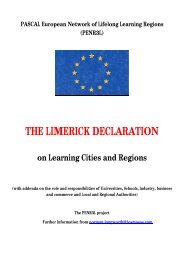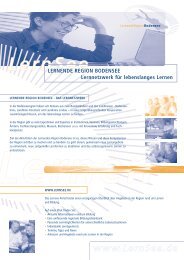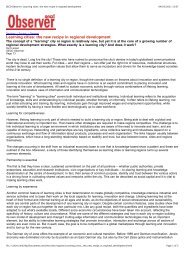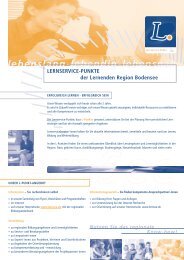Die Strategie für das Lebenslange Lernen ... - EUROlocal
Die Strategie für das Lebenslange Lernen ... - EUROlocal
Die Strategie für das Lebenslange Lernen ... - EUROlocal
Sie wollen auch ein ePaper? Erhöhen Sie die Reichweite Ihrer Titel.
YUMPU macht aus Druck-PDFs automatisch weboptimierte ePaper, die Google liebt.
102<br />
QUALITY IN EDUCATION<br />
Learning Metropolitan Region Hamburg (Hamburg/Schleswig-Holstein/Lower Saxony)<br />
Project: “Flexible Quality Development”<br />
I. Problem<br />
Establishing an ongoing process of quality development<br />
represents a considerable challenge for many providers of<br />
further training and education. In particular smaller institutions,<br />
which have few resources to invest in such a system,<br />
often cannot cope with the complexity of standard qualitymanagement<br />
systems. In view of the pressure of day-to-day<br />
business, the application of quality-management instruments<br />
quickly recedes into the background, and the expectations<br />
on the part of the staff are disappointed. The system<br />
runs into the sand.<br />
In addition, the institutions often have no insights into<br />
the quality practice of other institutions in the sector, and<br />
thus have nothing by which to orient themselves. At times<br />
when markets are becoming tighter and competition stiffer,<br />
it is decidedly difficult for individual institutions to obtain<br />
these insights. The realization that co-operation can work in<br />
spite of competition is only coming slowly.<br />
network, together with a comparison with one’s own<br />
score for the previous year. This quantitative benchmarking<br />
serves to provide the institutions with a coarse idea of<br />
where they are placed in relation to competitors in<br />
respect of their quality endeavours. This is the starting<br />
point for planning the institution’s improvement activities.<br />
• The implementation of these activities proceeds both<br />
internally within the individual institution, and also at the<br />
level of a number of co-operating optimization projects.<br />
The results of this joint work are recorded and placed at<br />
the disposal of the network once more, e.g. in the form of<br />
worksheets for the production of a QM-manual.<br />
Collaboration in the co-operative project allows for<br />
qualitative benchmarking.<br />
III. Outlook<br />
II. Solution approach<br />
Twenty-three further-education and training institutions in<br />
the Hamburg metropolitan region have joined together to<br />
form the “flexible quality development” project. These education<br />
providers, coming from a wide variety of educational<br />
sectors (EDP, languages, sports, academic further education<br />
etc.), are jointly in the process of introducing a system of<br />
ongoing quality development.<br />
The project consists of an annual “quality cycle”, in<br />
which the institutions pass through three consecutive<br />
stages.<br />
• The first stage is the annual self-assessment according to a<br />
self-assessment instrument jointly worked out in the project.<br />
In the framework of consensus workshops, the result<br />
is a joint picture of the strengths and improvement<br />
potential of one’s own organization.<br />
• Next, the institutions feed the results of this self-assessment<br />
into a data pool. The anonymized data allow a comparison<br />
to be made with the average and best scores in the<br />
In order to put a quality-development process on a solid<br />
basis, time is needed – as rule, between three and eight<br />
years. Against this background, all the institutions have<br />
undertaken to take part in the project for its entire duration.<br />
The participating institutions will have two-and-a-half quality<br />
assessment years while the project is running; the second<br />
half of the third year will be under the auspices of Weiterbildung<br />
Hamburg e.V. The aim is to put the ongoing approach<br />
on a permanent and sustainable basis and to steadily<br />
expand the group of participating institutions and thus also<br />
the data pool.<br />
www.lernende-metropole.de


